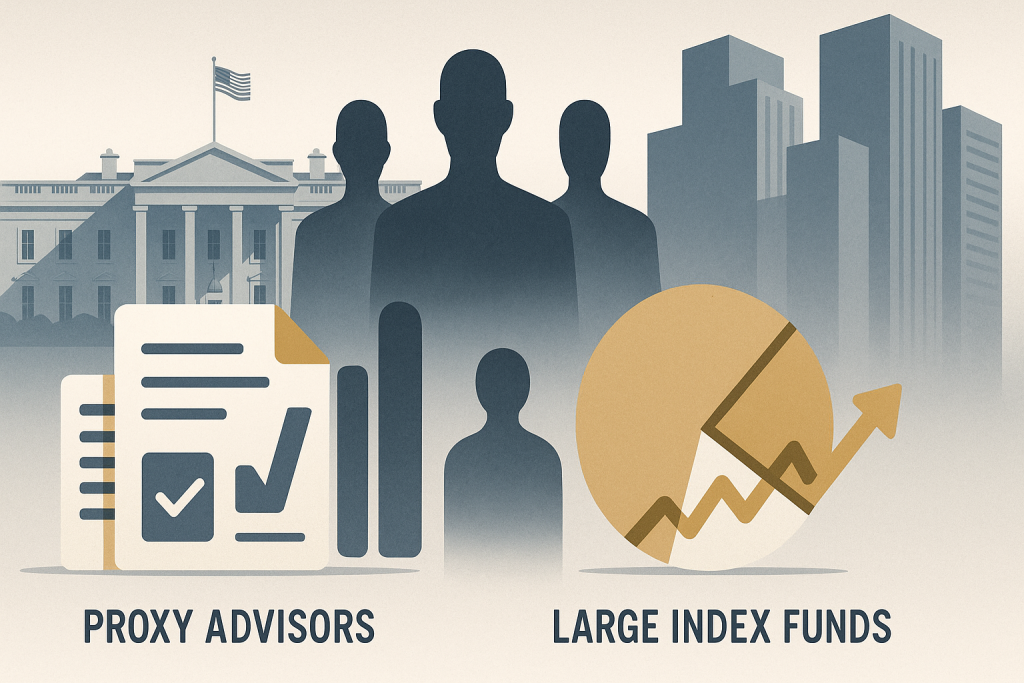The Trump administration is exploring an executive order that could fundamentally reshape corporate governance in America.
As per a Wall Street Journal report, the proposal would restrict proxy-advisory giants like Institutional Shareholder Services (ISS) and Glass Lewis while curbing the voting power of index-fund behemoths BlackRock, Vanguard, and State Street.
The move comes amid mounting pressure from billionaire executives like Elon Musk and JPMorgan CEO Jamie Dimon, who have criticized proxy advisers for wielding outsized influence over shareholder decisions.
If enacted, these rules would represent the most aggressive challenge yet to a voting model that has defined American corporate governance for decades.
The proxy advisory problem that won’t quit
For years, proxy advisers have operated in a lucrative gray zone.
ISS and Glass Lewis, which together control nearly 97% of the proxy-advice market, issue recommendations that investors rely on to vote on executive compensation, board elections, and environmental policies.
The problem? These two firms have no fiduciary duty to the investors they influence, face minimal SEC oversight, and operate a business model riddled with conflicts of interest.
They offer consulting services to companies while simultaneously issuing voting recommendations, a setup that critics argue enables potential market manipulation.
Research shows their recommendations can swing shareholder votes by as much as 30 percentage points, giving them kingmaker status without any real accountability.
The friction escalated recently when ISS recommended voting against Elon Musk’s $1 trillion Tesla pay package, a recommendation shareholders ultimately rejected, approving Musk’s compensation anyway.
Musk dubbed the advisers “corporate terrorists,” while Dimon called them “a cancer” that should be “gone and dead and done with.”
His criticism underscores a deeper frustration: proxy advisers spent years championing environmental, social, and governance (ESG) initiatives that, rightly or wrongly, many CEOs viewed as misaligned with shareholder value.
After Democrats lost political power, both firms quietly retreated, with ISS halting diversity guidance and Glass Lewis abandoning “singularly-focused research” recommendations, moves that revealed the political tilt critics had complained about all along.
The index fund vote that nobody asked for
The second piece of this overhaul targets index-fund voting.
BlackRock, Vanguard, and State Street manage roughly one-third of all US equities, controlling most shares in nearly 90% of S&P 500 companies.
They vote on behalf of millions of passive investors who simply wanted to own a market index, not participate in corporate governance battles.
Yet these three asset managers have wielded that dormant voting power to push policy positions that individual shareholders never explicitly authorized.
One White House proposal under discussion would force index funds to mirror client preferences rather than vote independently, a move that could democratize voting but also create practical challenges for fund managers handling millions of account holders with differing views.
The broader debate hinges on philosophy. Asset managers argue they’re “ultimate long-term investors” with a duty to shape governance.
Critics counter that passive investors seeking index returns shouldn’t be weaponized for ideological battles. Yet as the debate shifts, practical questions remain unresolved.
How would index funds navigate conflicting client instructions? Would voting disclosure requirements multiply? Would the rulemaking actually increase shareholder participation, or simply redistribute power from mega-fund managers to whoever shouts loudest?
The Trump administration hasn’t finalized any decisions, and the White House cautioned that reports remain speculative. ISS responded that it already operates transparently under SEC rules, while Glass Lewis declined to comment.
If the administration moves forward, expect Wall Street, proxy-advisory firms, and institutional investors to wage a fierce legal and lobbying campaign.
The post Trump plans major shakeup of shareholder voting power: here’s what may change appeared first on Invezz



